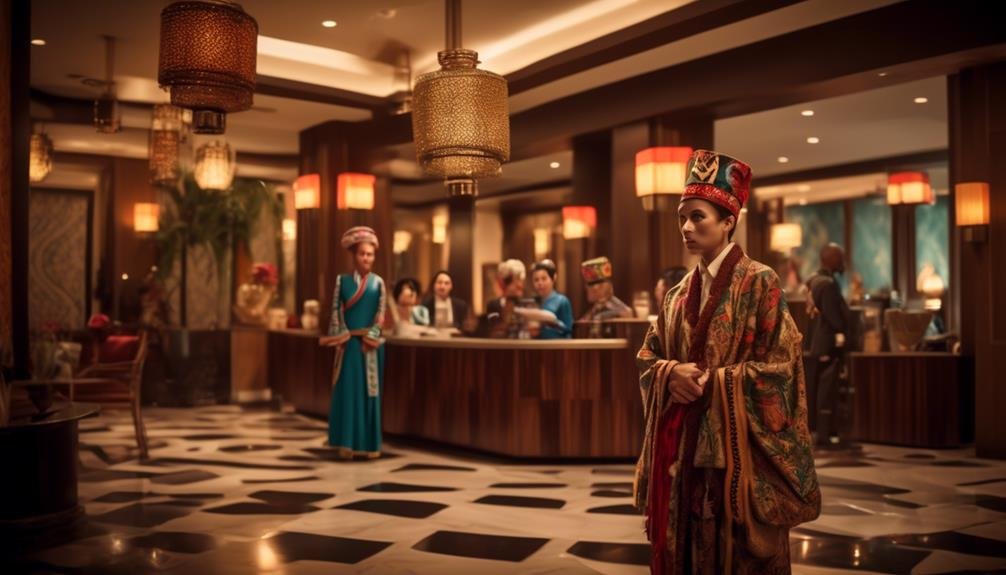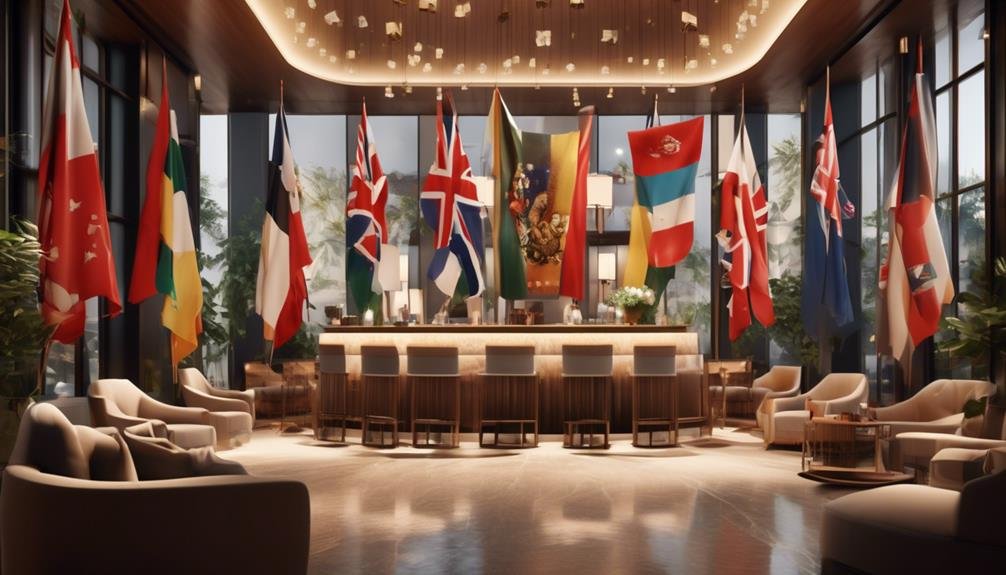Developing a Global Mindset in the Hotel Industry
You've mastered the intricacies of hotel management, from guest relations to revenue optimization. But have you considered the critical role of developing a global mindset in the ever-evolving landscape of the hotel industry?
As the world becomes increasingly interconnected, understanding and embracing diverse cultural perspectives is no longer a choice, but a necessity for success.
In this discussion, we'll explore the importance of cultivating a global mindset in hospitality and the practical strategies to navigate the complexities of international markets, language barriers, and cross-cultural communication.
Whether you're a seasoned hotelier or an aspiring professional, the insights shared here will undoubtedly shape your approach to the global hospitality landscape.
Key Takeaways
- Developing a global mindset in the hotel industry fosters cross-cultural awareness.
- It is important to implement cultural sensitivity training and encourage cross-cultural interactions in hotel operations.
- Adapting services to international markets involves conducting thorough research on cultural preferences and continuously refining and adapting offerings.
- Overcoming language and communication barriers requires investing in multilingual skills training and reliable translation tools.
Importance of Global Mindset in Hospitality
In today's globalized hospitality industry, cultivating a global mindset is crucial for success, as it fosters cross-cultural awareness, strategic thinking, and adaptability. Cultural sensitivity is essential in the hotel industry, as it allows you to understand and respect the diverse needs and preferences of guests from different cultural backgrounds.
By developing a global perspective, you can anticipate and cater to the unique requirements of international visitors, thereby enhancing their overall experience.
Having a global mindset also encourages strategic thinking, enabling you to identify opportunities for growth and expansion in new markets. Understanding the cultural nuances and business practices of various regions gives you a competitive edge in developing effective strategies for global success.
Additionally, adaptability is key in the dynamic hospitality sector. Embracing different cultural norms and adjusting your service delivery accordingly demonstrates your commitment to providing exceptional experiences for all guests, regardless of their origins.
Incorporating cultural sensitivity and a global perspective into your approach not only enriches the guest experience but also contributes to the overall success and sustainability of your hotel in the international market.
Cultural Intelligence in Hotel Operations
Cultivating cultural intelligence in hotel operations requires a keen understanding of diverse customs and traditions to enhance guest satisfaction and promote inclusive hospitality. To achieve this, consider the following:
- Cross-Cultural Interactions: Encourage staff to engage in cross-cultural interactions with guests, fostering an environment of mutual respect and understanding. This can be achieved through cultural awareness training and language courses, enabling employees to communicate effectively with guests from different cultural backgrounds.
- Cultural Sensitivity: Implement cultural sensitivity training programs to educate staff on the importance of recognizing and respecting cultural differences. This will enable them to anticipate and cater to the unique needs and preferences of diverse guests, ultimately enhancing the overall guest experience.
- Adaptability: Foster a culture of adaptability within your hotel operations, empowering employees to respond flexibly to diverse cultural expectations. This may involve customizing services, amenities, and dining options to align with the preferences of guests from varied cultural backgrounds.
Adapting Services to International Markets

When tailoring your hotel services to international markets, it's essential to proactively assess and understand the diverse cultural preferences and expectations of your potential guests. Cultural sensitivity is crucial in adapting your services to cater to a wide range of customer preferences.
Start by conducting thorough research on the cultural nuances of your target markets. This will enable you to make informed decisions about the services and amenities you offer. For example, some cultures may prioritize personalized and attentive service, while others may value efficiency and convenience. Understanding these differences will allow you to tailor your customer experience accordingly.
Additionally, ensure that your staff receives cross-cultural awareness training to effectively engage with international guests. Strategic thinking is key in adapting your services to international markets. It's vital to analyze market trends and customer feedback to continuously refine and adapt your offerings.
Overcoming Language and Communication Barriers
To effectively overcome language and communication barriers in the hotel industry, prioritize equipping your staff with multilingual skills and cultural communication training. This will allow your team to interact more effectively with international guests, enhancing their overall experience.
Consider implementing the following strategies to ensure seamless communication:
- Language Immersion Programs: Encourage your staff to participate in language immersion programs to enhance their proficiency in foreign languages. This will enable them to communicate more fluently with guests from diverse linguistic backgrounds, fostering a welcoming environment.
- Effective Translations: Invest in reliable translation tools and services to ensure that essential information such as signage, menus, and guest instructions are accurately translated. This will prevent misunderstandings and demonstrate your commitment to providing exceptional service to all guests.
- Cultural Communication Workshops: Organize workshops that focus on cultural nuances in communication. By equipping your staff with a deeper understanding of cultural differences, they can navigate conversations and interactions with sensitivity and respect.
Strategies for Cross-Cultural Training and Development

Enhancing cross-cultural competence through targeted training programs is essential for fostering an inclusive and adaptable workforce in the hotel industry. To develop a global mindset, it's crucial to implement strategies that focus on intercultural competence and diversity training.
Start by creating interactive workshops that provide insights into different cultural norms, communication styles, and business etiquettes. Offer scenario-based training to help employees navigate cross-cultural interactions effectively. Encourage active participation in cultural exchange programs and language courses to broaden perspectives and enhance language skills. Additionally, establish mentorship programs where employees from diverse backgrounds can share experiences and provide guidance to their colleagues.
Another effective strategy is to incorporate cultural competency assessments into performance evaluations, promoting the value of intercultural understanding within the organization. Furthermore, consider organizing cultural awareness events and celebrations to embrace diversity and foster a sense of belonging among employees.
It's also beneficial to provide resources such as online modules, reading materials, and access to cultural experts to continuously support employees in developing their intercultural competence. By prioritizing these strategies, hotel industry professionals can cultivate a workforce that isn't only culturally aware but also adept at navigating the complexities of a global market.
Conclusion
As you embark on the journey of developing a global mindset in the hotel industry, remember that the world is your oyster. Embrace new cultures, adapt to diverse markets, and overcome language barriers with strategic thinking and adaptability.
By honing your cultural intelligence and investing in cross-cultural training, you can ensure that your hotel operations are well-equipped to thrive in the international hospitality landscape.
The sky's the limit when you embrace a global mindset!



